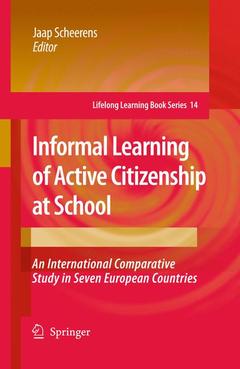Description
Informal Learning of Active Citizenship at School, 2009
An International Comparative Study in Seven European Countries
Lifelong Learning Book Series, Vol. 14
Coordinator: Scheerens Jaap
Language: English
Subjects for Informal Learning of Active Citizenship at School:
Publication date: 10-2010
370 p. · 15.5x23.5 cm · Paperback
Publication date: 02-2009
370 p. · 15.5x23.5 cm · Hardback
Description
/li>Contents
/li>Comment
/li>
Active citizenship is an objective of schooling in an increasingly complex context, in which social cohesion of the multicultural society is a cause for growing societal concern. International co-operation between European countries and a growing heterogeneity of the (school) populations of most European countries have led to an increased interest in education for citizenship. The core question dealt with pertains to the role that schools can play in developing citizenship through formal and informal learning.
Day-to-day school life is seen as a rich environment in which aspects of functioning in a democratic society and dynamic interplay with rules, leadership and peers with different backgrounds are experienced and form a source of learning. In this view the school context functions as a micro-cosmos to exercise ?school citizenship? as a bridge to societal citizenship and state citizenship. The book brings together material from Cyprus, Denmark, England, Germany, Italy, Romania and The Netherlands.
Editorial by Series Editors.- Acknowledgements.- List of Contributors.-
1. AIMS AND SCOPE OF THE STUDY; Jaap Scheerens.- 1.1 Aims and objectives.- 1.2 Intended project outcomes.- 1.3 Approach and organization.- 1.4 Other matters: equity-related issues concerning dis-advantaged groups.- 1.5 References.-
2. A CONCEPTUAL FRAMEWORK ON INFORMAL LEARNING OF ACTIVE CITIZENSHIP COMPETENCIES; Ralf Maslowski, Heiko Breit, Lutz H. Eckensberger, Jaap Scheerens.- 2.1 Introduction.- 2.3 Informal student activities and experiences.- 2.4 School context.- 2.5 Conceptual framework for this study.- 2.6 References.-
3. DESIGN OF THE CASE-STUDIES; PROCEDURE AND CONTENT; Jaap Scheerens.- 3.1 Introduction.-
Part 1: ROCEDURE; INSTRUCTIONS PROVIDED TO THE PARTICIPATING COUNTRIES.-
Part 2: OPERATIONALIZED CONCEPTUAL FRAMEWORK; CHECK-POINTS FOR DATA COLLECTION.-
Part 3 : WHOM TO ASK WHAT.-
ANNEX 1: Table of Correspondence.-
ANNEX 2: Dimensions of citizenship.-
4. CYPRUS; Petros Pashiardis, Maria Georgiou, Mihales Georghiou.- 4.1 The national context of citizenship education in Cyprus.- 4.2 Cyprus Research Report on Citizenship Education.- 4.3 References.-
5. DENMARK; Lejf Moos, John Krejsler, Per Fibæk Laursen.- 5.1 National report on citizenship education: Denmark.- 5.2 Danish Summary Report of Case Studies.- 5.3 References.-
6. ENGLAND; Sally Thomas, Wen Jung Peng and Wan Ching Yee.- 6.1 National Report on Citizenship Education in English Secondary School.- 6.2 Summary of Six Case Studies in England.- 6.3 References.- Appendix 6.1: Summary of Staff Questionnaire responses.-
7. GERMANY; Hermann Josef Abs, Heiko Breit, Annette Huppert, Anne Schmidt, Stefan Müller-Mathis.- 7.1 Context report on civic- and citizenship education in Germany.- 7.2 Report on Case Studies at Schools in Germany.- 7.3 References.-
8. ITALY; Giovanna Barzanò, Emanuela Brumana,Gianfrancesco Musumeci, Valeria Pastore, Mauro Palumbo, Marco Razzi.- 8.1 Citizenship Education at School in Italy; the national context.- 8.2 Citizenship Education at School in Italy; Case Studies Summary Report.- 8.3 References.- Annex: The most important recent norms related to citizenship education.-
9. ROMANIA; Megdonia Paunescu, Radu Alexandrescu.- 9.1 National report on citizenship education—Romania.- 9.2 Case Studies Summary Report—Romania.- 9.3 References.-
10. THE NETHERLANDS; Maria Hendriks, Jaap Scheerens.- 10.1 National report on citizenship education in the Netherlands; the Dutch context.- 10.2 Case Studies Summary Report—The Netherlands.- 10.3 References.- Annex to 10.1: Structure of secondary education.-
11. RECOMMENDATIONS AND CONSULTATION WITH POLICY MAKERS; Jaap Scheerens.- 11.1 Introduction.- 11.2 Recommendations for the project based on the best practices that have arisen from the research conducted in Cyprus.- 11.3 Recommendations based on critical incidents—Denmark.- 11.4 Recommendations to enhance informal learning opportunities for active citizenship—England.- 11.5 Recommendations—Germany.- 11.6 Recommendations and good practices—Italy.- 11.7 Consultation with policy makers regarding informal education at the school level—Romania.- 11.8 Recommendations—the Netherlands.- 11.9 Conclusion.- 11.10 References.-
12. CONCLUSIONS.- 12.1 Introduction.- 12.2 A brief recapitalization of the Conceptual Framework.- 12.3 The national context of citizenship education in the seven participating countries.- 12.4 Informal learning for active citizenship at school; the school context across the seven participating countries.- 12.5 Critical incidents that illustrate informal learning for citizenship.- 12.6 Final discussion.- 12.7 References.-
Index.
Addresses informal learning at school, an innovative topic
Provides rich case descriptions from seven countries
Shows the road ahead in how schools can deal with citizenship education
Is embedded in an explicit theoretical framework




